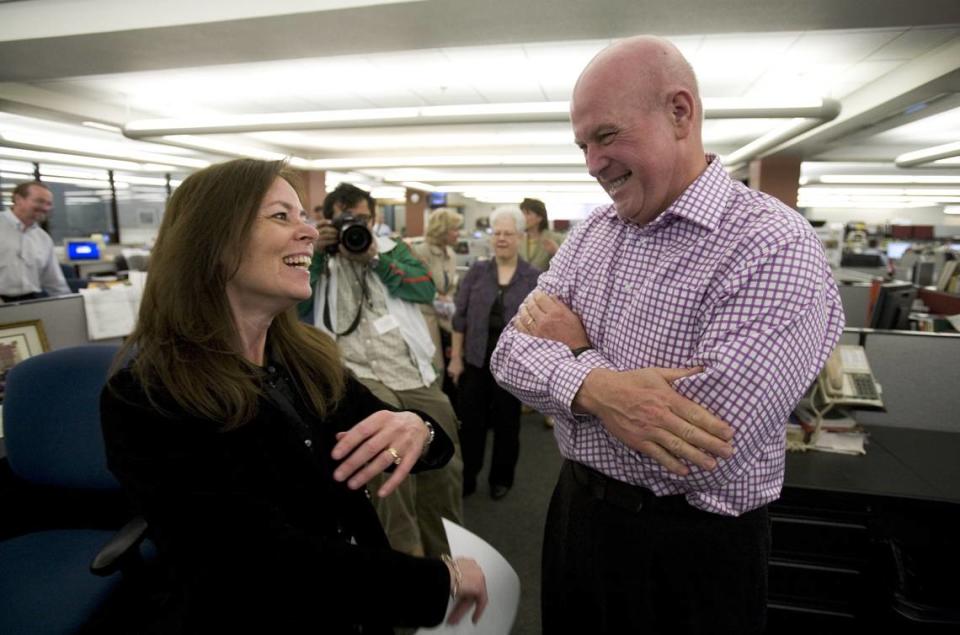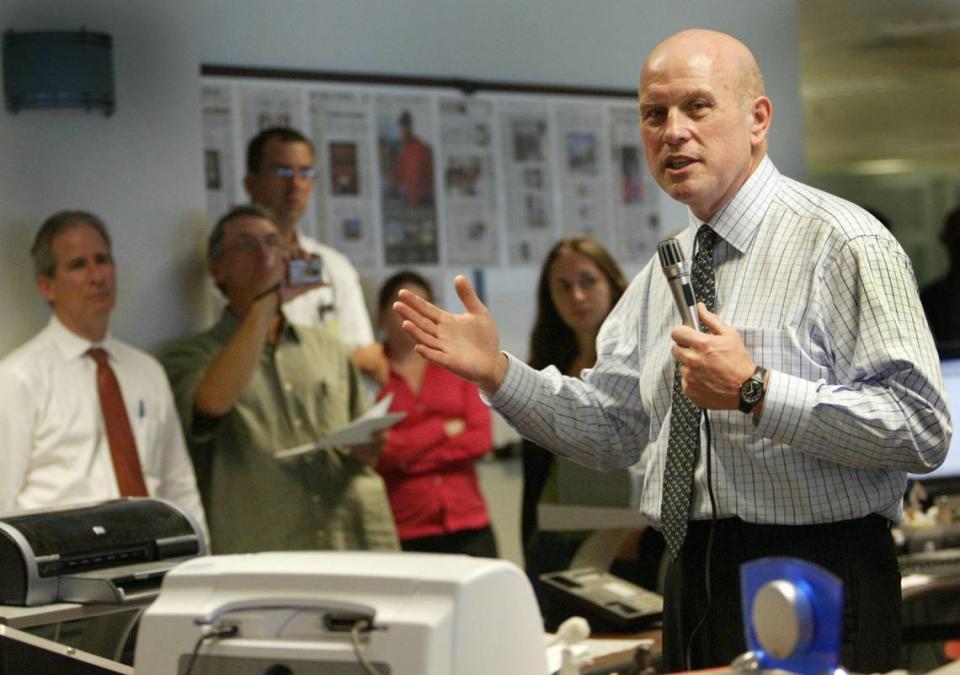Howard Weaver, Pulitzer Prize winner and former top exec for Bee parent McClatchy, dies at 73
Howard Weaver, a giant of local journalism who earned a Pulitzer Prize reporting for the Anchorage Daily News and oversaw another Pulitzer as its editor before capping his four-decade career as vice president of news for McClatchy, the parent company of The Sacramento Bee, died Thursday evening. He was 73.
Weaver died at his home in Sacramento of pancreatic cancer, the Alaska newspaper first reported Friday, after diagnosis in December 2022.
Born on Oct. 15, 1950, in Alaska’s most populous city, Weaver joined the Anchorage Daily News out of college in 1972, the newspaper’s obituary said. By 1976, he’d won the Pulitzer Prize for public service as part of a reporting team that covered pipeline-era corruption in a series titled “Empire: The Alaska Teamsters Story.”
Weaver left the Daily News soon after the Pulitzer win to start a statewide weekly paper, the Alaska Advocate, but returned to the daily newspaper when The McClatchy Co. bought it in 1979. (McClatchy sold the Anchorage Daily News in 2014.)
Weaver served as “top editor” from then until 1992, the Alaska newspaper reported. With Weaver at the helm, the Anchorage Daily News won its second-ever Pulitzer Prize in 1989, also in the public service category, honoring a series titled “A People in Peril.”

After the Daily News’ main competitor, the Anchorage Times, closed in 1992, Weaver spent a year at Cambridge University earning a master’s degree then returned to the newsroom in his home state.
McClatchy moved Weaver in 1995 to the company’s headquarters in Sacramento, where he was tapped to become an expert and adviser in what was then a burgeoning new field in journalism: digital media.
By 1997 he held the title of editorial page editor for The Sacramento Bee. In 2001 he was named McClatchy’s vice president of news, overseeing the company’s daily newspapers from Alaska to North Carolina.
“During his years in Anchorage as its editor, the Daily News was a prime example of what a newspaper can and should serve its community, its state and engage its readers on all platforms available,” Gregory Favre, Weaver’s predecessor as McClatchy’s vice president of news from 1989 to 2001 and a former Sacramento Bee executive editor, said in an email.
“But most of all, he was a journalist ... a truly excellent one, who was devoted to bringing light where there was darkness, truth where there was falsity, humanity where there was inhumanity wherever he worked.”
Weaver remained vice president of news for McClatchy until his retirement in 2008.
“There’s a lot of stories of just how he took the enormous good work that he did in Alaska and found ways to spread that across a whole country of newspapers,” said Anders Gyllenhaal, who took over as McClatchy’s vice president of news shortly after Weaver’s retirement, serving in the position for six years. “He had tremendous good humor that was sort of the sauce on which he would deliver all kinds of lessons.”
The Bee, in a 2008 story announcing Weaver’s departure, reported that Weaver’s decision to retire at age 58 came from the desire to spend more time with his wife and to explore non-journalistic writing, but was also prompted by the 2007 death of his younger brother and only sibling, Mark.
Weaver split his post-retirement life between Sacramento and a ranch in the nearby Sierra Nevada foothills, the Anchorage Daily News reported.
Tom Kizzia, in the opening paragraph of the paper’s obituary, called Weaver “the preeminent Alaska journalist of his generation, leading the Anchorage Daily News to national prominence with Pulitzer Prizes and victory in one of America’s last great newspaper wars.”

Gyllenhaal called the Daily News’ triumph over the Anchorage Times a classic “David and Goliath story.” Weaver documented it in his own words in a 2012 memoir titled, “Write Hard, Die Free: Dispatches from the Battlefields & Barrooms of the Great Alaska Newspaper War.”
When Weaver stepped in as McClatchy’s vice president of news, Gyllenhaal was the editor of The News & Observer in Raleigh, North Carolina. He said Weaver made the most “of a time when newspapers were very strong and were able to speak to whole communities on what was going on in those towns.”
Gyllenhaal called Weaver’s love for journalism “contagious.”
In a 2012 audio interview published by the Columbia University Graduate School of Journalism, Weaver spoke of the appeal of journalism and editing.
“One of the really cool things about journalism to me, and particularly being an editor, was you got to exercise your ethical faculties,” he said. “And like anything else, your ethical capacity — the more you exercise it, the stronger it gets.”
Weaver is survived by his wife of 45 years, Barbara Hodgin; his niece, Cheaney Weaver; and his grandniece, Julie Bea Weaver, according to the Daily News.


